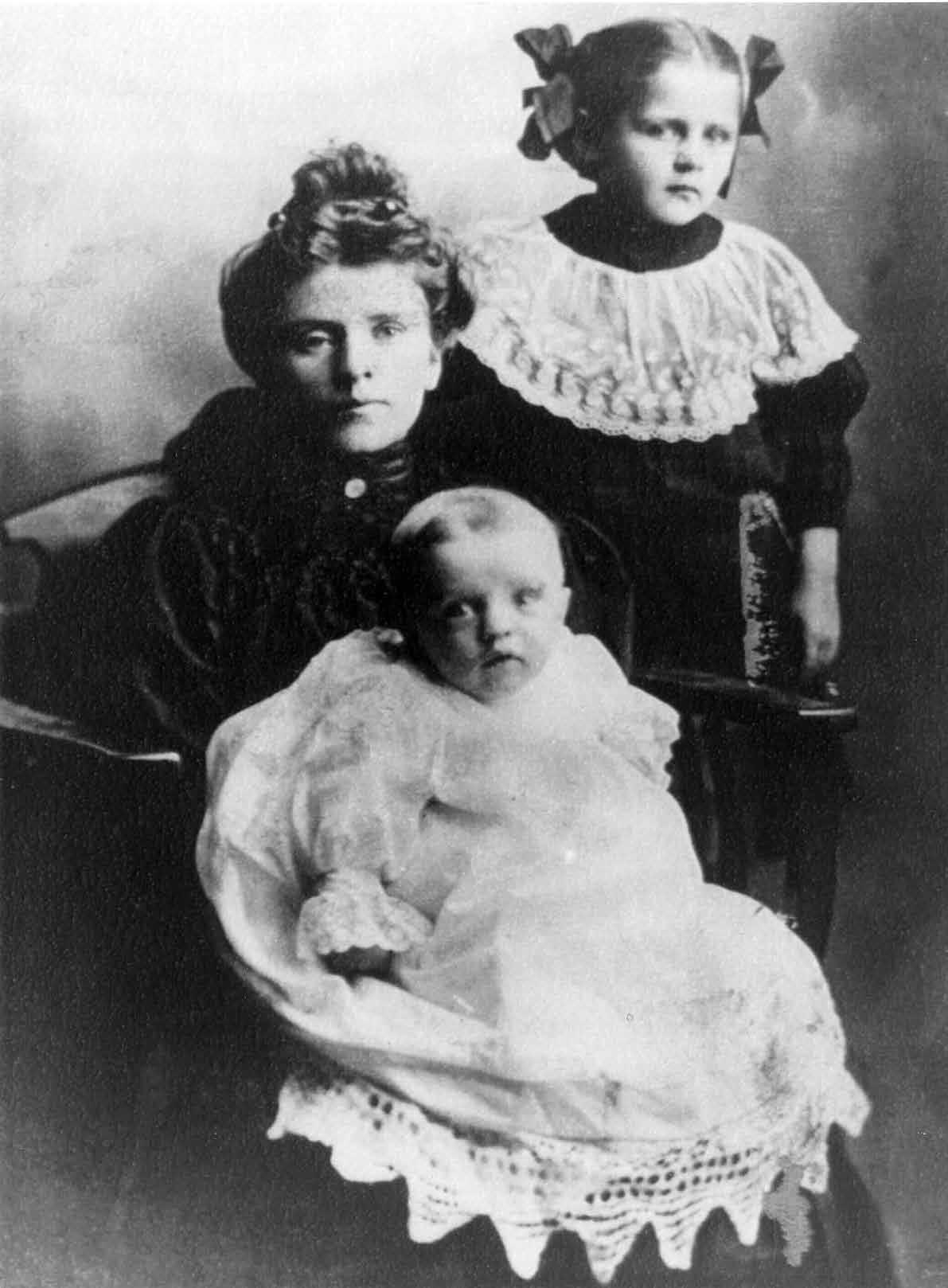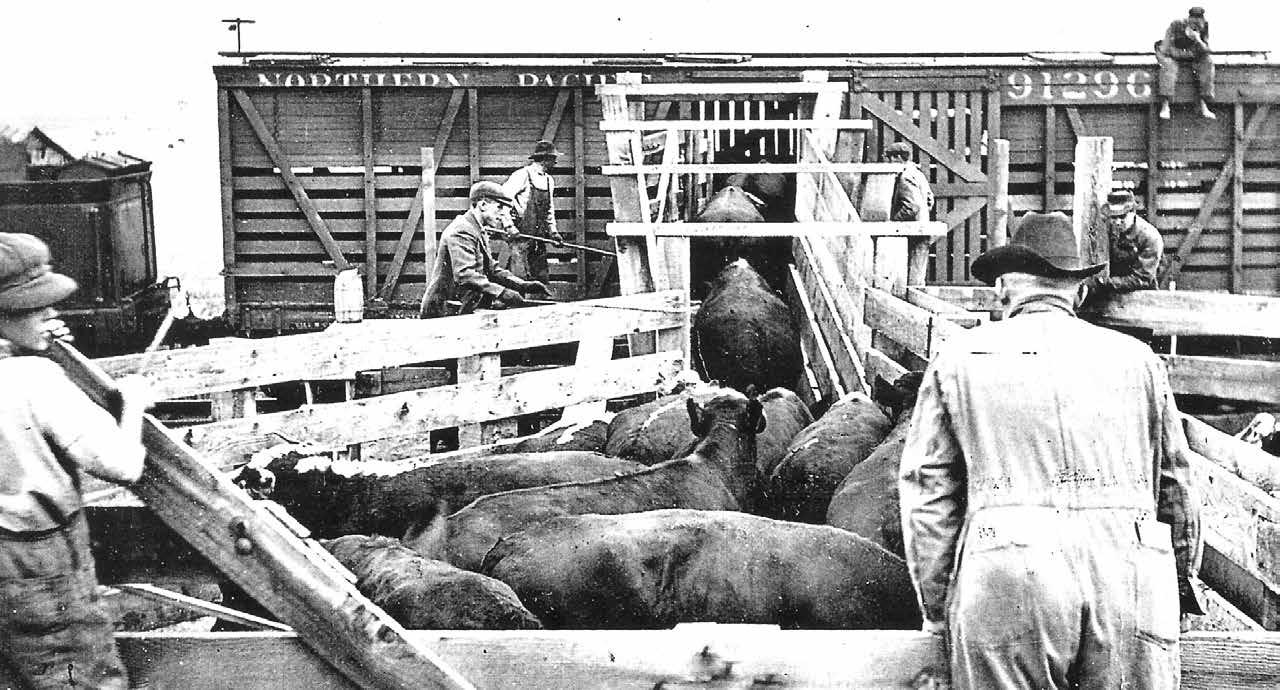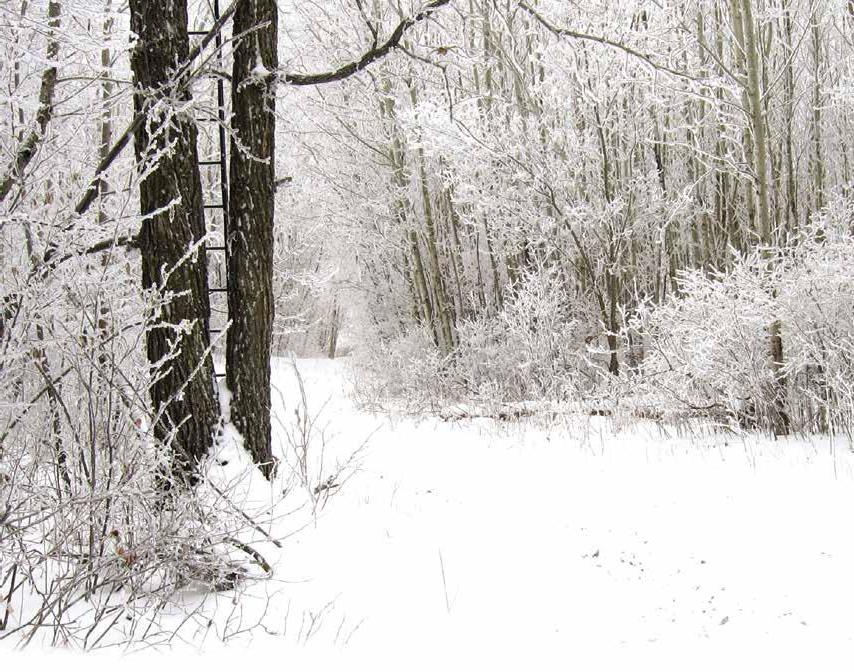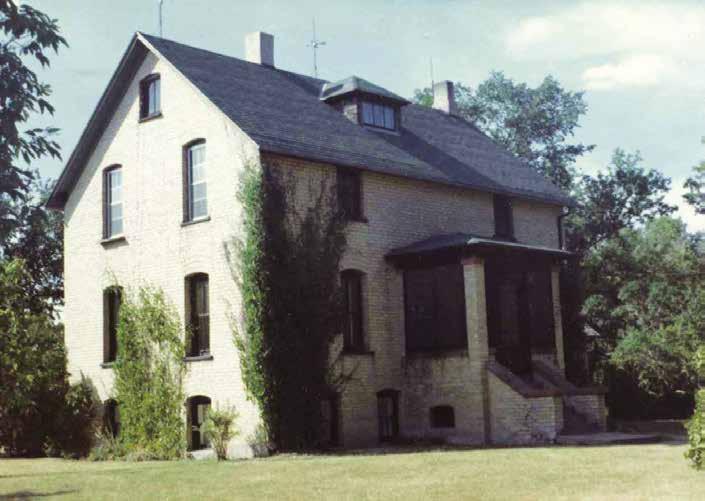
21 minute read
Letters to Eva
All photos courtesy of the author.
By Nita K. Ritzke
Advertisement
The summer of 2014 had crisped the grass before I got around to cleaning out the small memento box. My yard in Bismarck was hard, cracked and felt like a scrub brush under my bare feet but direct sunlight made the onionskin paper easier to read. I had planned to finish sorting out my grandmother’s old letters and postcards in a manner of minutes. Instead, I became transfixed by the words of a young man who sailed to Austria in September 1936. He was about eighteen, the same age as many of the college students I teach. Like them, he was full of aspiration, energy, and marveled at new discoveries. As I opened each envelope, I was caught up in the suspense of a personal history whose outline I knew but whose mysteries would keep me searching the rest of the summer.
Grandma Eva and Grandpa Paul Ritzke built a farmhouse near Parshall, North Dakota, after their first home in Van Hook was inundated by the waters that became part of Lake Sakakawea in the late 1940s. My grandmother had always a small chest —a shoebox-sized cedar case with brass hasps and clasps that made it look like a treasure chest. Within the chest were rosaries from “the nuns” (three of her sisters belonged to the Order of Saint Benedict), a lock of blond hair from when Eva was young, a number of photographs, and a stack of letters addressed to “Mrs. Paul Ritzke, Rt. 2, Van Hook, N.D.”
The letters were from her younger brother, Herman Niermann. While Eva was struggling through the dirt and drought of the Depression in 1936, Herman was on his way to a Jesuit seminary in Austria. Grandma Eva rarely spoke about sad or uncomfortable subjects so the ten pieces of correspondence she had saved—written from 1937 to 1944— must have held some particular significance.
After brushing up on the years leading up to World War II in Europe, I went back into my grandmother’s photo albums and Bibles in an effort to understand the references made in her brother’s letters. I wondered if somewhere there were relatives I didn’t know who might have the letters she had written to Herman.
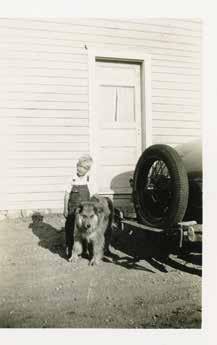
“Teddy” Ritzke (1936)
LETTER 1
Canisianum Innsbruck, Austria
Feb. 21, 1937
Dear sister & Family:
Quite a time has gone by since I received your interesting letter. Whenever I have nothing to do for the moment, I sometimes reread letters and I can assure [you] that I reread your letter also a few times. Especially during the last few days as I haven’t received a letter from the States for the longest time that I reckon that something must have happened that they didn’t write sooner. And that picture of Teddy that you enclosed certainly is a good one of him. I suppose that he is having a good time now with the toys that he got for Christmas. Does he still remember me? I’ll bet he doesn’t. Does he go to school when it is so cold like it is in the States now? In the last letters that I got from home everyone wrote that they were having snow and that it was colder than ever. So I suppose that you got some of the cold up in the Dakotas also.
During our Christmas vacation almost all of the Americans went to a sort of a hotel which we call a “Gasthouse” over here. It is on the side of a mountain near a town which is about six miles away from Innsbruck. I have a few exams I have to take yet. After they are over with I had intended to go to Rome to see the Pope but as he is quite sick and one cannot be certain if a person can get to see him, I thought that perhaps it will be just as cheap to wait a year at least and then go. This year it would be very cheap as the Italian lira has fallen and this year we can get about 22 lira per dollar while last year a person could get only about 14. So you see, there is quite a difference. As it is, I think that I will make a small trip through southern Tyrol, the name of the county or province in which Innsbruck itself is.
I have great plans for next summer; there is a nice fellow here who comes from Louisville, Kentucky. If everything turns out all right for the two of us, we intend to make our trip through Germany on bikes and sleep in a tent. That certainly will be a nice experience. We asked a German about it and he said that it would be just the thing. He had done it several times already, he said. I’m dreaming of the pancakes we will have then. Will they ever taste good! I’m sure that they will be the best pancakes that I ever tasted, because the last one that I ate was one that Mother made at home. The food is so different here. Hardly anything is like it is at home. I wrote to our relatives in Germany already and found out that I have an Uncle there yet. He was Dad’s half-brother, I think. He called himself my uncle when he wrote. I don’t mind as then I will certainly be welcome there. That is the way the German people are; if you are any relation of theirs at all, and if it is only their fifth cousin, you will be welcome to stay there as long as you like. I’m going to try to look up Mother’s relatives also. Her mother came from Trier and I’ll be going through that city on my way back from Ibbenburen which is where Dad’s relatives live. I have great plans now and I hope that they won’t change any more. I’ll let you know more about it next summer when we will be eating grapes along the Rhine. Find out about the relatives of the Ritzke’s and maybe they live just on my way up there, so I could visit them also.
Right now I’m eating a piece of dry brown bread which is almost as solid as a rock. That is what we can get all kinds of to eat between meals. Oh! It’s great stuff! (Gr-r-r!) For breakfast we get a piece of dry white bread and some coffee made out of fig juice, or milk. And for the rest of the stuff that we get for dinner and supper, I believe that the nuns who fix it are the only ones who know exactly what is in it.
Well, I’ll ring off and get back to my studies, hoping that this letter will interest you although I don’t see how it can. When you get time again let me know how the wind blows out there in Dakota.
Am remembering you all in my prayers, Your brother, Herman
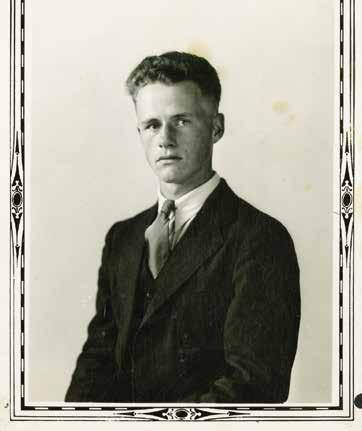
Herman B. Niermann passport photo (1936)
LETTER 2
Canisianum Innsbruck, Austria
July 12, 1937
Dear sister Eva & family:
A long time has already passed since you have heard from me. During the months of June and part of May, I did not get much of a chance to do much writing, on account of the many exams that I had to take.
From what I hear from home this year, you will most probably have a good crop this year. I only hope that hail or something like that doesn’t happen to the crops. I heard that you and Paul are running two farms this year. I guess that the only thing that one can do is pray, and that real hard. Yes I remember you all in my prayers. Not that you especially need them, because you are so bad but who is there among us who doesn’t stand in need of prayers?
You spoke something about traveling about a bit if you had the necessary money; that reminds me, I got a letter from a cousin of ours who lives in Florida. I found out quite a bit about our relationship from her. There are 11 children in their family, but I figured, they haven’t got ours beat have they? That is mother’s brother’s family. I have to write to her yet, too. I also write to a cousin in Germany, whom I expect to see within a few weeks after I leave here.
For my Easter vacation I went to South Tirol with a German. The vacation lasted ten days, and I enjoyed every day of it. We took all our stuff along in a knap-sack which we carried on our backs. At nights we slept in some small place as it cost only about 12¢ per person and we had private beds and everything. We didn’t get so very far because we walked all the way. Most of the time we stayed on some small mountain-path where we could see the whole valley below us. I am sending you a picture which was taken up on the mountainside. That what I have in my hands is a real old Tirolean plow. It certainly is different from the ones which we use in the States isn’t it? You can see my pack laying on the ground in back of me. It sure was heavy towards the end of the hike. Way in the background you can see a part of the mountain further back. The white spots on it is [sic] snow.
About a week ago we had our Independence Day Banquet. It was held about 15 miles south of Innsbruck on the road to Italy. It was real “hoity-toity” if you know just what I mean. We had a real feed and everyone got enough to eat. The Englishmen are allowed to go to the same banquet because they belong to the same “Landsmannschaft,” that is the American landsmannschaft. (1) That is because they haven’t enough men over to start a schaft of their own. We had a great feed and a good time while we were out there. We even had real American pie even though it didn’t taste anything like one that is made at home. The next day everyone was feeling “down in the dumps,” at least I was.
1. In this context, he is referring to a group of compatriots celebrating a national holiday: Independence Day
No doubt you are quite busy right now, as you have two farms on your hands instead of just the one like you had last year. I wish that I could help you out this year for some time, for I surely would appreciate it to do a little work for the salt in my bread. I hope that I can find something to do while I am up at my relatives. Dad surely will be pleased if I can find something which once belonged to him when he was yet here in Germany. There’s supposed to be a big picture of him up there somewhere which was taken while he was in the army. If only I can get a hold of that, it will tickle him pink.
Right now, they are having quite a bit of trouble in Germany, on account of the Hitler men bothering the priests and the Catholics. About 46 priests were put in jail and many more were tried before a legal court. Also some of the Bishops were called on as witnesses. It’s getting worse and worse up there. Most probably it will get as bad as it was when dad was still there. Of course if I go up there, I won’t have any trouble because I’m an American and they can’t do anything to me. I just feel sorry for the people who live there. The worst part of it is, that they are not even allowed to leave the country, first of all because it is forbidden and secondly because they are not allowed to take any money out of the country. At one time there were about 150 Germans here in the house, and next year not more than ten are expected to come back. There is one German priest here at present, and he is staying in Austria during the summer, because he is sure that if he went back, he would never be allowed to return again. It is a tough ball game for them. Some of them realize that the time will come for them when they will have to choose between the Church and the State in Germany, that is Hitler. I just hope that Austria will be able to keep out of his way because there are heaps of real poor people living in Austria.
Give my best regards to the rest of the relatives up there, and say a prayer for me once in a while, for I’m sure I need it badly.
Your brother, Herman
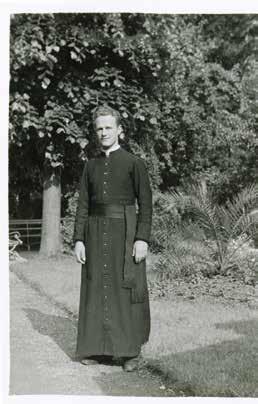
Herman in the garden at Canisianum (1938).
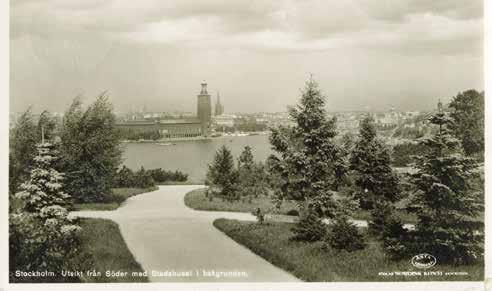
Stockholm
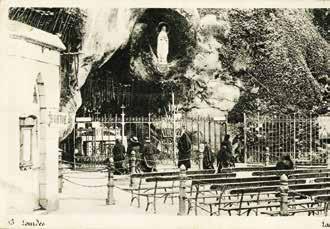
The shrine at Lourdes
---
By the time I had read the second letter, I realized Herman would not have been able to please his father due to the escalation of Hitler’s power. I wondered what Eva might have been doing aside from cleaning the face of my then six-year-old father. I envisioned the life of a farm wife and imagined she read the letter leaning on her fencepost or while soaking the laundry. I exhausted the Ritzke-Niermann ancestry documents I possess and invested time on the internet where I found a Ritzke-Niermann contact in Maryland. I learned Herman—one of fourteen siblings— may have engaged with the Church for economic reasons: a vocation of necessity. He likely felt obliged to the Church for sponsoring his studies while he lessened the burden on his family back in the States. Perhaps Eva felt a similar motive. I was told it was common at the time for sibling families to marry: my grandmother married Paul Ritzke around the same time her brother Anton married Paul’s sister Margaret. Whatever their motives, I felt the stark difference between our generations.
Besides Herman’s letters, Eva received local, national, and world news via radio or through the weekly paper. Thanks to the State Historical Society of North Dakota Archives, I spent a few days trying to imagine how Eva paired Herman’s words against reports in the paper. The Van Hook Reporter printed photos of Hitler’s youth groups touring Rome and within a year would show massive Nazi military displays in Nuremberg.
POSTCARD 1
Stockholm, Sweden
Aug. 26, 1937
Dear sister and family:
I’m in Sweden now with my two friends. We came here on bicycles. We sleep in tents, wash our own clothes and prepare our own meals and so it’s quite cheap. Sweden is very beautiful and very much like at home, only the people speak “Swenska” instead of English. Ha! From here we are going to Oslo, Norway on bikes. I hope you had a good crop this year. Wish I could have helped you harvest it. I have to start studying again on Oct. 2.
Until then,
Your brother, Herman
Greetings to all from Sweden!
---
Shortly after Herman’s return to Austria, he learned of his father’s death. I wondered if this was the reason for the year’s gap between the letters and no mention of the loss later. I was told that Herman knew his father had been found dead but was spared from learning of the conflicting reports as to cause or that the body was found in a church. Amid any personal grief, Herman’s life was upturned when Germany assumed control or “annexed” Austria in March of 1938. Almost a year passes between correspondences.
---
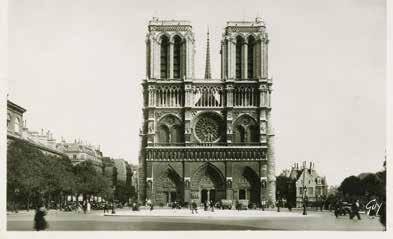
Paris
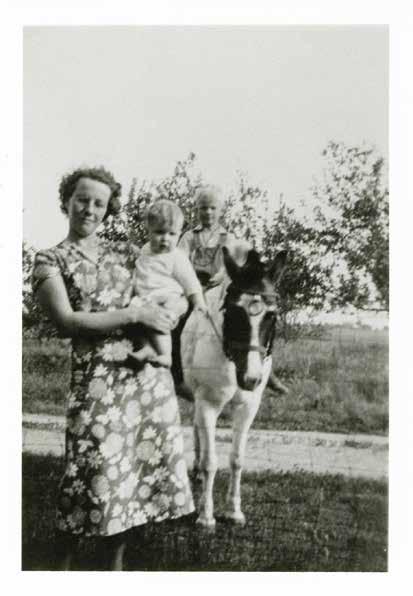
Eva holding her son Joe Denis with Ted on the horse (1939).
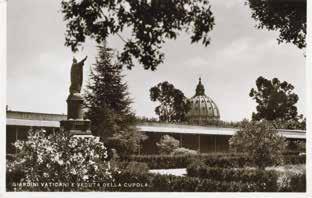
Vatican
POSTCARD 2
Lourdes, France
August 13, 1938
My dear sister and family: Am praying for you here at Lourdes before the shrine of the Blessed Virgin, that she may help you through your hour when it comes. Am enjoying my stay here as a stretcher-bearer for the sick and crippled that come by the hundreds to pray before the shrine. Only wish I could remain here longer!
Love,
Your brother, Herm
---
I was curious about Herman’s comment regarding Eva’s “hour” and initially thought of “hour of death” as in a Hail Mary prayer. Later, it dawned on me that he was referring to the time Eva would deliver her child. Birth and death were closely related. Five years earlier, Eva had given birth to her second child, Rose. The baby had only survived for two weeks during the Depression and cold of December 1933. Herman’s note of encouragement was postmarked two months before Eva’s due date, a time when polio, encephalitis, and disease related to consuming unpasteurized milk were taking their toll on North Dakota children.
---
POSTCARD 3
Paris, France
August 27, 1938
Dear sis and family: Received your letter and was glad to hear Teddy’s grown up to be so big already. Surprised to hear that Mary has twins! I will leave Paris for the relations tomorrow, and am sorry to leave Paris. So many interesting things here. Wish I could help you harvest your bumper crop this year.
Love,
Your brother, Herm
POSTCARD 4
November 4, 1938
My dear sister:
Greetings from the Vatican. Am on my Easter vacation. Saw Florence, Assisi, now Rome. When I’m in Austria I can’t write what I want to anymore. Am enjoying my trip OUT of Austria (or Germany) very much.
Love,
Your brother, Herm
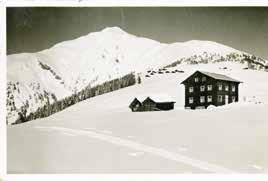
POSTCARD 5
December 30, 1938
Dear sis & fam:
Sorry I couldn’t send you a Xmas card—the Canisianum is taken over by the government & we had to leave—that’s why. We are in Switzerland now, where it is much better. Perhaps mother wrote about it to you. I’ll write later on. We’re not entirely settled as yet. Am staying at this hut for skiing now.
Love,
Your brother, Herm
---
By the time Eva received word of her brother’s safety, her son Joseph Denis was two months old. Herman was displaced and signs of unrest—both around and within him—become more obvious.
---
LETTER 3
College Americain Sion, Valais, Switzerland
July 7, 1939
My dear sis:
It’s been an awful long time since I’ve written to you. However, now since you have visited with Mom you no doubt know all about what I’m doing. I am leaving tomorrow morn right after Mass—I need not tell you about my summer plans as you no doubt got all that at home.
Was glad to hear that you (at least) expect a good crop this year. I also heard all about Joe Denis from the nuns. Guess they liked the little shaver. He ought to be quite big when I get home. I’ll bet Teddy does not remember me, does he?
You know, I’d give a few of my summer vacations over here for just one on the farm again back home. The Lord knows I’m not worth much there, but I can do quite a bit. Over here most of the Americans do not know anything about a farm and that at times makes me feel out of place.
At times things are not going so smoothly for me either. I am making this pilgrimage to Lourdes for a very special intention and I hope that my request is granted.
Greetings to Paul and Teddy. If Ted is old enough to write, tell me to write me a little letter too, the next time you write. (I don’t know how old he is now.) If he did, I’m sure he would get a kick out of it. I will write back to him in my next letter then. Guess I’ve just run out of news, so will close.
Love,
Your brother, Herm
LETTER 4
College Americain Sion, Valais, Switzerland
Nov. 23, 1939
My dear sister:
Was glad to hear from you again and also that you have hopes of having a good crop this fall. I suppose that by the time this reaches you, all the grain etc. will be in the barns, and you will be settling down for the long winter months.
I suppose that you are wondering what has happened to me now that the war has scared so many people at home. Mother and all the rest at home thought that I would have to come home soon, but that will not happen unless Switzerland is invaded, and that is not very probable. Next year we might not be here anymore, but if we won’t then we will move again to some other country, Italy perhaps. The Lord alone knows. But in any case, I’m sure that I’ll have to come home soon. Right now, all I hear of the war is what I read in the newspapers, which are not very many, as we are not allowed to have papers.
Some of our relatives in Germany are in the army now, and I suppose at the front. They are not allowed to write things like that, but a person has to be able to read between the lines when they write. I feel sorry for many of them, as things are not as they could be in Germany. Last summer I had intended to pay my yearly visit, but this war prevented my doing so. One of the men who was in the last war has long ago been called up for military service again. This I know for sure. I don’t know very much about Mother’s relatives, and I wanted to stop in there during the summer and find out more about them. I hope that I’ll be able to see them again before I go home. If the war lasts that long then it will surely be impossible.
Give my best regards to Paul and Ted. If you gave them to Joey, he wouldn’t understand them anyway! Ha! Ha!
Love!
Your brother, Herm
LETTER 5
College Americain Sion, Valais, Switzerland
March 31, 1940
Dear sister & family:
I was glad to hear from you for Christmas and I thank you for the card, too. Since that time I have been kept very busy and considered myself lucky to get off a quick letter to Mom every two weeks.
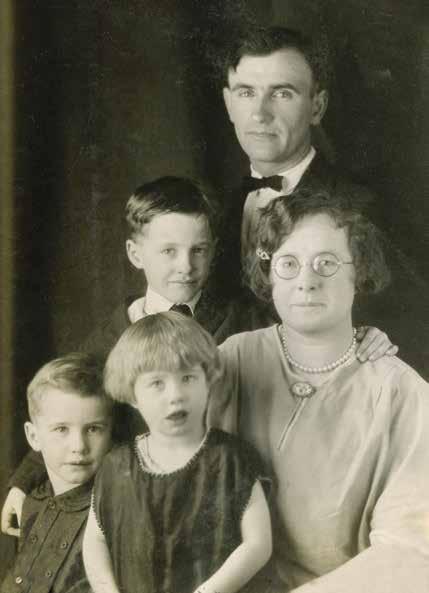
Herman and Harriet with Joe, William, and Patty (late 1940s).
No one here knows yet if we have to move out of Switzerland or not. We ought to know in another month at least. If we do move it will be either to Rome or northern Italy. I do not mind that, but only hope that we will not be forced to return to the States, as it would be hard on us to change professors now.
I was glad to hear that Paul got a bit of fur in his trapping. I wish I could try my hand at things like that.
Just a little more than two years and I’ll be back home again. Maybe sooner, if we are sent home. Then I’ll have only my studies to worry about.
My kindest and best regards to Paul and the boys. I remember you all in my prayers.
As ever, your brother, Herman
---
Herman was sent home probably weeks after posting the last extant letter. He was living with his widowed mother and sisters in time to be counted by the 1940 U.S. Census. Since he had dedicated so much effort to his seminary studies, I was surprised by the last token in the chest: a wedding invitation to the nuptials of Harriet Elizabeth Forge to Mr. Herman B. Niermann.
Rather than taking the sacrament of Holy Orders, he was married June 7, 1944—the day after D-Day. The date resonated with me that summer as I watched seventieth anniversary commemorations on television. June 7 is also the birth date of my daughter, making the connection to Herman and Eva’s lives even more vivid. I discovered other coincidences of birth and war. Like his sister, Herman had two boys and one girl. Herman and Eva each had a son named Joseph. Eva’s son Joe Denis would himself father two girls and one boy (Joe Jr.). Her other son, Theodore, broke ranks and had five children, including me, and none of them are named Joe.
Eva outlived her husband, her son Ted, as well as Herman. She kept the cedar box with the letters on her dresser at the farm and took it with her to the nursing home. Now it rests on my dresser. Herman’s letters connect the events in Europe leading to World War II to lives at home on the prairies of North Dakota. Eva also kept letters and postcards from “Teddy” during the Korean War and from Joe Denis when he deployed to Vietnam. Perhaps as they wrote, her sons knew how she treasured small tokens sent from far away. Perhaps they knew exactly where she'd keep them.
Nita K. Ritzke writes and teaches in Bismarck, North Dakota. She earned a B.S. from Minot State University, an M.A. from the University of North Dakota, and a Ph.D. from the University of Nebraska-Lincoln.. When not walking her dog Mojo, she strives to bake as well as her mother and grandmothers.

